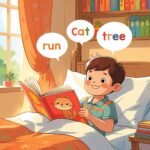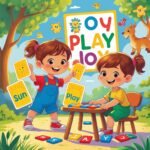Table of Contents


Entering Class 3 is a special step in every child’s life. English is no longer just about alphabets and simple words; it becomes a journey of imagination, storytelling, and meaningful expression. The English Class 3 First 5 Chapters are carefully chosen to introduce children to values, creativity, and communication skills. For parents, understanding what these chapters are about helps them engage with their child’s learning in a supportive and enjoyable way.
Let us explore each of these chapters in detail, along with their importance and how parents can make them more meaningful at home.
Chapter 1 – Good Morning (Poem)
The very first chapter in Class 3 English is the cheerful poem Good Morning. It is a simple yet powerful piece that greets the sun, the sky, the trees, and the birds. The poem sets the tone for positivity and encourages children to look at nature with love and curiosity.

This opening chapter plays an important role in building vocabulary through everyday words. It also teaches the rhythm of English, as children enjoy reading the poem aloud with energy. Parents can use this chapter to create a daily reading ritual by encouraging children to recite the poem every morning. By doing so, the poem becomes more than lines in a book—it becomes a habit of starting the day with joy and gratitude.
The English Class 3 First 5 Chapters begin here with a gentle reminder that learning should always be connected to life. Through “Good Morning,” children realize that even small greetings and positive expressions bring warmth and kindness into everyday routine.

Chapter 2 – The Magic Garden (Story)
The second chapter introduces children to The Magic Garden, a beautiful story about a school garden filled with magical flowers and fairies. This story takes children beyond the ordinary and allows them to imagine a world where plants and fairies can talk.

The chapter strengthens creative thinking and introduces the idea that nature is alive and should be respected. The flowers and fairies represent the harmony between humans and the natural world. For children, this becomes an exciting entry into fantasy, where they not only read but also imagine scenes in their minds.
Parents can extend this lesson by taking their children to a real garden or encouraging them to care for plants at home. Talking about flowers, trees, and their importance makes the story more meaningful. The English Class 3 First 5 Chapters are carefully designed to balance reality with imagination, and this story shows how creativity and learning can go hand in hand.
Chapter 3 – Bird Talk (Poem)
The third chapter is a poem called Bird Talk, where two birds—Robin and Jay—converse about how different they are from human beings. The poem is light-hearted but teaches children to appreciate differences between living beings.

Through this poem, children learn new vocabulary and understand that diversity in the world is natural and beautiful. The rhythmic pattern makes it enjoyable to recite, which improves pronunciation and confidence in speaking. It also encourages children to observe birds more closely in real life, sparking curiosity about nature.
Parents can make this lesson interactive by asking their child what they think birds would say if they could talk to us. Such small conversations inspire creative storytelling and self-expression. By the time children reach this chapter, the English Class 3 First 5 Chapters already establish a balance between imagination, moral values, and fun.

Chapter 4 – Nina and the Baby Sparrows (Story)
The fourth chapter tells the heartwarming story of Nina and the Baby Sparrows. It focuses on a young girl named Nina, who is worried about leaving her bedroom window closed while her family attends a wedding. She fears that if the window is shut, the baby sparrows in her room will not be able to fly out.

This story is powerful because it highlights compassion, empathy, and kindness toward animals. It shows children that caring for others, even small creatures like sparrows, is an important value. It also introduces children to decision-making, as Nina chooses to sacrifice her own comfort for the well-being of the baby birds.
Parents can use this story to discuss kindness and responsibility with their children. They can also connect it with real-life situations, such as feeding stray animals or helping someone in need. The English Class 3 First 5 Chapters reach a deeper emotional level here, showing that stories are not just about reading but about shaping character and empathy.
Chapter 5 – Little by Little (Poem)
The fifth chapter is the poem Little by Little, which tells the story of an acorn growing into a mighty oak tree. It teaches patience, persistence, and the importance of small efforts leading to big achievements.

The message of the poem is extremely valuable for children at this age. It tells them that just like the acorn grows slowly, they too must take small steps to succeed in studies and in life. It encourages them not to give up and to trust the process of growth.
Parents can relate this poem to their child’s own progress. For example, learning English itself is a gradual journey. Each new word, each poem recited, and each story read contributes to growth. With this chapter, the English Class 3 First 5 Chapters end on a motivational note, reminding children that effort, consistency, and patience always bear fruit.
Why English Class 3 First 5 Chapters Are Important for Parents and Students
When we look at these five chapters together, it becomes clear that they are not random selections but carefully chosen lessons to shape a child’s language skills and moral values. The English Class 3 First 5 Chapters combine the beauty of poetry with the depth of storytelling. They teach children to appreciate nature, embrace imagination, respect differences, show compassion, and practice patience.

For parents, these chapters are opportunities to connect with their children on a deeper level. Reading poems together, discussing stories, and relating them to real life create a learning environment that goes beyond classrooms. The themes of greetings, gardens, birds, kindness, and growth are all universal and relevant in everyday life.

By understanding these chapters, parents can guide their children not just academically but emotionally. They can reinforce values, build confidence in language, and ensure that their child enjoys learning. In the long run, this early involvement shapes not only better students but also better individuals.
Conclusion – Making the Most of English Class 3 First 5 Chapters
The English Class 3 First 5 Chapters are more than just lessons in a book. They are stepping stones for building strong communication skills, moral values, and imaginative thinking. Each chapter carries a unique message, whether it is the cheerfulness of “Good Morning,” the magic of gardens, the playfulness of bird conversations, the kindness of Nina, or the patience taught by the little acorn.

For parents, these chapters are invitations to become partners in their child’s learning journey. By engaging with them, discussing the stories, and reciting the poems, parents can transform English from a subject into an experience. The early chapters of English Class 3 show us that language learning is not about memorization or exams, but about discovery, growth, and joy.
When children see learning as fun, they not only perform better in academics but also carry forward the values they learn into their daily lives. That is the true purpose of the English Class 3 First 5 Chapters—to help children grow into confident, thoughtful, and compassionate individuals. And with tools like the Focus Fun App, parents can make this journey even more engaging by blending screen time with meaningful, interactive learning. Focus Fun ensures that children learn smartly, enjoy the process, and stay away from unhealthy mobile habits—making education both modern and joyful.
FAQ’s
1. What are essential activities for improving English Class 3 vocabulary?
Daily reading of age-appropriate stories with pictures helps students encounter new words naturally. Word games, flashcards, a “word-of-the-day” activity, and using new words in simple sentences reinforce learning. Consistency is vital for vocabulary mastery.
2. How do parents make Class 3 English learning a daily routine?
Break learning into manageable daily tasks such as reading aloud, vocabulary exercises, sentence writing, speaking dialogue, comprehension questions, revision, and creative prompts—spreading these across the week keeps learning steady and engaging.
3. How can parents build a supportive environment for shy children learning English?
Create a safe, non-judgmental space where the child feels comfortable speaking. Offer one-on-one support, celebrate every achievement, and use visuals like flashcards or posters to make learning less intimidating and more engaging.
4. How to help kids with reading fluency in Class 3 English?

Many parents encourage daily reading aloud of simple stories or poems. Pairing this with praise for their progress and discussing the story afterward helps build confidence and comprehension—turning reading into an enjoyable routine.
5. . What’s the best way to teach grammar to Class 3 kids without making it boring?
Real-world advice suggests integrating grammar into daily life. For example, ask children to spot nouns around the house or act out verbs. Use storytelling with grammar prompts and encourage sentence formation in casual conversations instead of formal drills.
6. How can I improve my child’s writing interest in English Class 3?
Parents successfully boost writing by prompting children to write short diary entries, letters to family, or imaginative stories. Using pictures or prompts makes writing less intimidating and more creative—expression should come before correction.
7. How can I improve my child’s vocabulary in English Class 3?

Daily conversations and story reading help. You can also use vocabulary games, flashcards, and fun word puzzles to expand your child’s word power in a playful way.
8. What online tools are helpful for English Class 3 learning?
Users recommend free resources like interactive story websites, educational apps with quizzes or games, and animated reading videos. Even just 15–20 minutes of guided online fun daily can supplement school learning effectively.
9. How can parents support speaking skills for Class 3 English?
Simple strategies work well. Encourage children to describe their day in English, talk about their favorite storybook, or role-play dialogue from a story. Casual daily practice builds fluency organically.
10. How can I make Class 3 English interesting for my child?
You can make it interesting by mixing reading with fun activities. The Focus Fun app adds games, and interactive exercises that make learning joyful instead of boring.
